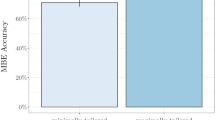Abstract
Over a three-semester period in a large undergraduate human development course, students were assigned to 5–7 member groups to work together in preparing for an exam in one of the five content units in the course. Their exam performance was tracked over three units: a baseline unit in which students worked only individually, a unit in which they worked in cooperative teams, and a follow-up unit in which the formal cooperative team structure was removed. Three different bonus-credit contingencies were used in the cooperative learning unit across the three semesters: (a) awarding full bonus credit to each individual in the group if the group as a whole improved its exam performance by the specified amount, (b) awarding partial bonus credit to each individual in the group if the group as a whole improved it exam performance by the specified amount and full bonus credit to each individual who also improved by the specified amount, and (c) awarding full bonus credit to an individual in the group if both the group and the individual improved exam performance by the specified amount. The three contingencies produced somewhat similar patterns of change for low and average performers, but the high performers fared better under the last two contingencies than under the group-only contingency.
Similar content being viewed by others
References
Hampton, D. R., & Grudnitski, G. (1996). Does cooperative learning mean equal learning? Journal of Education for Business, 7, 5–17.
Johnson, D. W., & Johnson, R. T. (1994). Learning together and alone (4th ed.). Needham Heights, MA: Allyn and Bacon.
Johnson, D. W., & Johnson, R. T. (1992, October). What to say to advocates for the gifted. Educational Leadership, 50, 44–47.
Johnson, D. W., Johnson, R. T., & Smith, K. A. (1998). Cooperative learning returns to college. Change, 30(4), 26–35.
Kagan, S. (1985). Dimensions of cooperative classroom structures. In R. Slavin, S. Sharan, S. Kagan, R. Hertz-Lazarowitz, C. Webb, & R. Schmuck (Eds.), Learning to cooperate, cooperating to learn(pp. 67–96). New York: Plenum Press.
Kennett, D. J., & Young, A. M. (1999). Is cooperative learning effective for high achieving entrance students? Implications for policy and teaching resources. Journal of Research and Development in Education, 33, 27–35.
Lloyd, J. W., Eberhardt, M. J., & Drake, G. P. (1996). Group versus individual reinforcement contingencies within the context of group study conditions. Journal of Applied Behavior Analysis, 29, 189–200.
Litow, L., & Pumroy, D. K. (1975). A brief review of classroom group-oriented contingencies. Journal of Applied Behavior Analysis, 8, 341–347.
Popkin, J., & Skinner, C. H. (2003). Enhancing academic performance in a classroom serving students with serious emotional disturbance: Interdependent group contingencies with randomly selected components. School Psychology Review, 32, 282–295.
Skinner, C. H., Williams, R. L., & Neddenriep, C. (2004). Using interdependent group-oriented reinforcement to enhance academic performance in general education classrooms. School Psychology Review, 33, 383–397.
Slavin, R. E. (1987). Cooperative learning: Where behavioral and humanistic approaches to classroom motivation meet. The Elementary School Journal, 88, 29–37.
Slavin, R. E. (1987). Developmental and motivational perspectives on cooperative learning: A reconciliation. Child Development, 58, 1161–1167.
Slavin, R. E. (1991, February). Synthesis of research on cooperative learning. Educational Leadership, 5, 71–82.
Slavin, R. E. (1996a). Cooperative learning in middle and secondary schools. The Clearing House, 4, 200–210.
Slavin, R. E. (1996b). Research on cooperative learning and achievement: What we know, what we need to know. Contemporary Educational Psychology, 21(1), 43–69.
Slavin, R. E. (1995). Cooperative learning: Theory, research and practice(2nd ed.). Needham Heights, MA: Allyn and Bacon.
Speltz, M. L., Shimamura, J. W., & McReynolds, W. T. (1982). Procedural variations in group contingencies: Effects on children’s academic and social behaviors. Journal of Applied Behavior Analysis, 15, 533–544.
Springer, L., Stanne, M. E., & Donovan, S. S. (1999). Effects of small-group learning on undergraduates in science, mathematics, engineering, and technology: A meta-analysis. Review of Educational Research, 69, 21–51.
Stockdale, S. L., & Williams, R. L. (2004). Cooperative learning groups at the college level: Differential effects on high, average, and low exam performers. Journal of Behavioral Education, 13, 37–50.
Wallace, M. A., & Williams, R. L. (2003). Multiple-choice exams: Explanations for student choices. Teaching of Psychology, 30, 136–138.
Author information
Authors and Affiliations
Corresponding author
Rights and permissions
About this article
Cite this article
Williams, R.L., Carroll, E. & Hautau, B. Individual Accountability in Cooperative Learning Groups at the College Level: Differential Effects on High, Average, and Low Exam Performers. J Behav Educ 14, 167–188 (2005). https://doi.org/10.1007/s10864-005-6296-3
Issue Date:
DOI: https://doi.org/10.1007/s10864-005-6296-3




